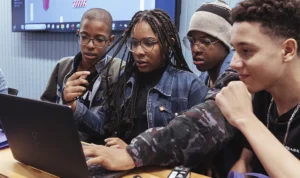Thienne Czizeweski grew up in Florianópolis (SC) and studied at a school in the neighborhood. At the age of ten, he found out that there would be an entrance test for military school and asked his father to participate. “I saw the opportunity to study in a place where teaching was better”, he says.
Good student, she passed the test. On the first day of school, she looked around and saw no one like her. “I was the only black girl in the room,” she says. Over time, he began to feel a certain loneliness. “I had friends, but on some level I didn’t identify with them.”
It may be because she felt a need to be very good, even though she had won medals of honor for merit (given to those who had a bimonthly average above 8.5) during
the entire period he studied there. “I grew up with this great self-demand. I struggled to go further, I felt like I needed to fill a gap. Only later did I understand that this feeling was related to the fact that I was a black woman.”
When she was a sophomore in high school, Thienne discovered she was pregnant. “It was a total breach of expectations and a very difficult moment for me”, he recalls. “I tried so hard to go to the curve of 'I can also occupy this space', but I returned to the stigmatized place where society places black women, limited to positions of care and service and low qualifications. If it was difficult before, imagine it now.”
When her son, Francisco, was born, Thienne had just turned 17 and was in the middle of her third year of high school. “I had no idea what motherhood was, I was completely unprepared. It was very important to have structure and to have my parents and sisters by my side, saying it was going to work.”
After a year at home, she wanted to return to her studies. “I was always very ambitious and I wasn’t content with the idea of not having a professional perspective. I'm very uncomfortable and I question why we need to accept things as they are. Yes, I’m a mother — and what else?”, she says.
Rebalancing the game
Thienne took a course, was approved at two public universities and chose to study Chemical Engineering at the Federal University of Santa Catarina. “I am very communicative and I like people, but at the same time I have an aptitude for Exact Sciences. I chose a profession that would bring me financial independence more quickly, because I was responsible for a child. I wanted to get out of that place of financial and psychological dependence.”
College was like a replay of the school: no black students (let alone female students) around. That loneliness of the past came back, strong. “Nobody there understood my reality,” says Thienne. While her colleagues lived their day-to-day life at university, she juggled her studies with the responsibilities of motherhood.
When he needed to make the second call for a test he missed to take care of his son, the teacher scheduled a random time, outside of class time. Upon hearing her say that she would need to agree at home who could take care of Francisco, the teacher replied that the problem was not his. “There was no reception.”
To rebalance the game and reach the market competitively, Thienne decided to do internships — first in a paint industry, then in a state-owned effluent treatment company. Through experiences, he learned what he didn't want: working in rigid, hierarchical environments, which looked at processes without considering people, and where there was discrimination.
“I heard that I wouldn’t be respected if I wore makeup. It doesn’t make any sense to define my competence by gender criteria”, he says. These experiences were the turning point that led her to the technology area and the type of culture she wanted to work with.
When he was about to graduate, Thienne began exploring job possibilities in the city's technology hub. “It’s an area where I could apply my knowledge in mathematics and processes”, he explains. Soon, he started working in a startup, Geek Hunter, which at the time was developing software for hiring developers.
In a small team, one of his tasks was to prospect customers to understand if the software worked, that is, to prove its market value and attract investors. Another was to engage people to register or accept vacancies.
It was then that Thienne became interested in knowing what happened after people were hired. This curiosity opened the way for her to think about how she could work with processes, but applied to the area of people management. And it took her to a new job, now in the recruitment department of another technology company — only much bigger, with around 200 employees.
Diversity in practice
For her, this was a new key change in working with processes in the area of people selection and taking the first steps in diversity actions, one of the values of the new company.
“Like other jobs, I realized I was alone there too. The system was not being inclusive for black people and women, just look at how many employees there were in the administration and how many were developers”, he recalls. It was then that she began to work on diversity as a strategy, to encourage and organize actions such as committees, affirmative vacancies and literacy to bring inclusion and opportunities.
For the engineer, it was a moment of great growth. “Thienne, who thought life was over in the third year, was there working in a super innovative multinational. I wanted this place to also be accessible to other people who, like me, had no idea that they could get here, nor did they dream of that possibility.”
Three years later, Thienne was already recognized for her diversity initiatives and gave lectures on the topic, but she still wanted to grow further. “After I had my son, I stopped dreaming about opportunities because I needed to be down to earth to manage day to day life. During the pandemic, with the possibility of remote work, I realized that there was greater potential that I could explore. On this journey, I discovered myself as a dreamer again.”
She started looking for a new job and, after three selection processes, she received three offers. One of them was from XP, but she felt butterflies in her stomach because she had never worked in the financial sector. Once again, Thienne broke expectations and decided to face the unknown.
“Where did it say that the financial market was not for me? I ran the risk of taking a step too far, but I trusted my potential”, he says. “Black women carry a value that is given by society: those who serve, those who do not study, those who get pregnant early. Many people believe this. Being able to tell myself that I was capable of taking this leap was a challenging hurdle to overcome.”
A more far-reaching movement
At XP, Thienne works with technology and people at the same time, in the Talent Intelligence department — which also involves a lot of statistics and mathematics. Your biggest challenge? “Ensure that we are not taking our biases into account when choosing professionals for vacancies”, he responds.
To handle the high volume of candidates for open positions, your area uses artificial intelligence to select talent. “We use mathematics and data analysis in an area that historically uses insights to make decisions about who is the right person for the chair,” he explains. “Every algorithm is tested and goes through counter-testing to find out if it is inclusive or if it has biases that could be exclusionary.”
“We need to accept that we are prejudiced. If we train the machine, it will be too. The algorithm cannot read that I am a good candidate because I studied at the federal university, but rather understand my ability to deliver the expected results”, he adds.
Today, her mission is to ensure that people like her are not the only ones in the room — or in the office. “Diversity structures everything I do. “There is no process that we carry out that does not have diversity in the strategic agenda. I really want it to be easier for those who come after.”
Today, Thienne participates in movements that unite more companies in building spaces with more equity and that converge with his personal journey. “The growth of the discussion on the ESG agenda is already moving the needle in the 'S', for 'Social', significantly in the strategic agendas of corporations”, he says. “I am no longer alone: there is an important collective construction happening that needs to be consistent in the long term.”
Recently, she was at iFood headquarters as presenter of the launch event of the Tech Movement. The initiative, which has iFood and XP as sponsors — in addition to having a partnership with BNDES (National Bank for Economic and Social Development) and 20 other institutions and companies, has precisely the objective of training young people to work with technology, offering courses free services, scholarship programs and support for entering the job market. The program aims to raise R$ 100 million over the next three years to combat the technological blackout.
“Participating in the Tech Movement is reinforcing the importance of the collective pact to break historical cycles of lack of equity and inclusion in the job market. It is also about being sure that many people will dream again, just as I was able to on my journey, and discover themselves capable, competent and prepared to occupy spaces that were previously denied to them”, adds Thienne.


